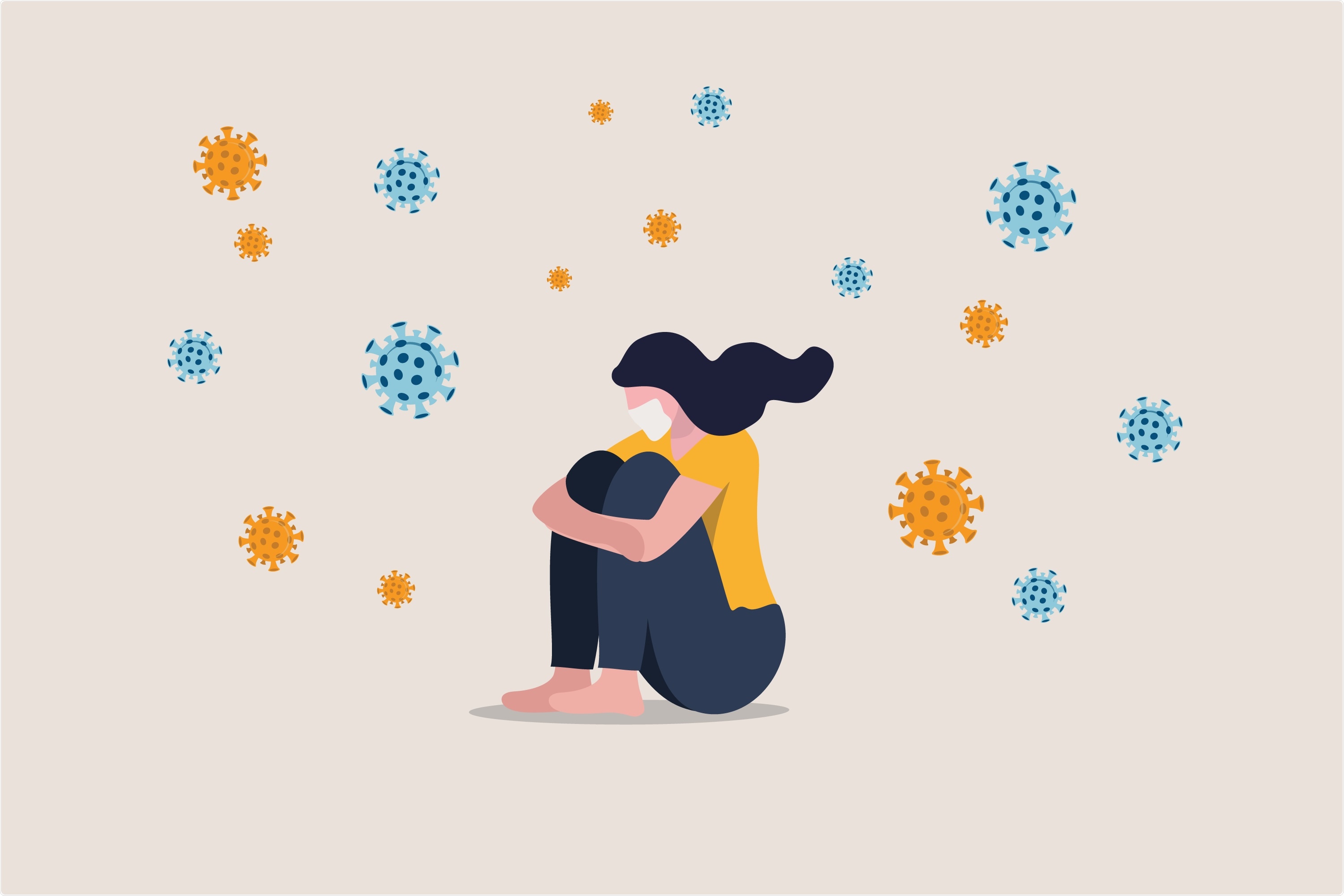This study was conducted as part of the Global Burden of Disease (GBD) Study 2020 which is in the process of estimating the prevalence, mortality, and health burden of over 300 diseases and injuries, this includes 12 mental disorders.
We suspected from past population shocks in history (e.g., war, localized pandemics, financial crises) that the prevalence of major depressive disorder and anxiety disorders likely increased during 2020 because of the COVID-19 pandemic, our question was "by how much?". Not accounting for the pandemic could be interpreted as "no change" in the prevalence of these disorders for 2020, which we knew was not the case. So we developed a novel methodology to account for the impact of the COVID-19 pandemic on the prevalence of these disorders.

Image Credit: Maridav/Shutterstock.com
With many countries going into lockdown over the last 18 months, how has COVID-19 impacted mental health?
The COVID-19 pandemic has likely impacted mental health in many different ways. The pandemic has created an environment where many determinants of mental health are impacted.
Examples include (but are not limited to) reduced social contact and interaction with peers, economic impacts, loss of livelihood, increasing rates of domestic violence, and decreased access to mental health services.
Can you describe how you carried out your latest research into the impact of COVID-19 on mental health?
We conducted a systematic review of the literature to compile survey data on the prevalence of depressive and anxiety disorders during the COVID-19 pandemic, with corresponding pre-pandemic prevalence estimates.
From this, we developed a model to quantify the association between the change in prevalence and indicators of the COVID-19 pandemic, specifically the daily COVID-19 infection rate and human mobility (population movement). We didn’t have prevalence change estimates for the globe, but we did have estimates of these COVID-19 impact indicators across the globe.
We, therefore, extrapolated the prevalence change across the globe based on the estimated association between the prevalence change of these disorders and the COVID-19 impact indicators. We had pre-pandemic estimates of the prevalence of these disorders as part of the Global Burden of Disease Study (informed by pre-2020 data) and so we were able to adjust these pre-pandemic estimates by the extrapolated prevalence change estimates.
What did your results show? Were there any differences observed between the different sexes? If so, what were the differences, and what are some of the explanations for this?
We estimated the prevalence of major depressive disorder rose 28% globally, and anxiety disorders rose 26% globally. This corresponds to 53 million people with major depressive disorder and 76 million people with anxiety disorders due to the COVID-19 pandemic.
The observed change was higher for women, and we believe it is because women are more likely to be affected by the social and economic consequences of the pandemic. Women are more likely to take on the additional carer and household responsibilities due to school closures or family members becoming unwell. Women also tend to have lower salaries, fewer savings, and less secure employment than men, and so are more likely to be financially disadvantaged during the pandemic.
There is also evidence that domestic violence has increased during lockdown periods, and women are more likely victims of domestic violence than men.

Image Credit: eamesBot/Shutterstock.com
Were there any limitations to your research? If so, what were they?
There were several limitations that I think are important for people to consider when interpreting our estimates. First, most of the data we obtained to inform the association between prevalence change and the COVID-19 impact indicators were from high-income countries, and we have had to assume this association is applicable globally. We have no data from some of the regions where we’ve estimated the largest increases, for example, South Asia and North Africa, and the Middle East.
There are also limitations to our COVID-19 impact indicators, for example, human mobility is an index informed by anonymous cell phone mobility data. If people of low socioeconomic status from a particular location are less likely to have a cell phone than people of high socioeconomic status, then the human mobility from that location may only represent the mobility of people of high socioeconomic status (who may have a greater ability to reduce their movements for work, etc.).
There were also few studies using diagnostic instruments, and so we had to take advantage of studies that used symptom scales with established thresholds of probable diagnosis. Fortunately, we modeled the prevalence change with this data (rather than the actual prevalence), and so assuming the predictive validity of these scales to a full diagnosis remains constant pre- and mid-pandemic, the change in prevalence from these scales is equivalent to the change in diagnostic prevalence.
However this is an additional assumption we have had to make, and there are currently not enough data to test this assumption.
A large amount of the research into the COVID-19 pandemic has been into its causes and developing vaccines. Why is it just as important to investigate the impacts lockdown and the virus itself have had on not only people's physical health but their mental health also?
Even before the COVID-19 pandemic, major depressive disorder and anxiety disorders were leading causes of disease burden in most countries, with the mental health systems in most countries not well equipped to deal with this high burden.
Again the COVID-19 pandemic has created an environment where many determinants of mental health are impacted, and this has meant that the demand on these mental health systems has now increased. Mental disorders are not just personally disabling, but are also increase one’s risk for other disabling health conditions and suicide. They also have societal impacts, including (but not limited to) reduced work productivity, increased absenteeism, increased carer responsibilities, etc.
We have to seriously re-evaluate how we respond to the mental health needs of the population moving forward.

Image Credit: Elizaveta Galitckaia/Shutterstock.com
What can governments and policymakers do to help strengthen global mental health systems and what impact would this have on people suffering from these disorders?
Again before 2020 major depressive disorder and anxiety disorders were already leading causes of disease burden in most countries, with the mental health systems in most countries not well equipped to deal with this high burden. COVID-19 has meant that the demand for these mental health systems has now increased.
We hope governments, service planners, and policymakers consider the added burden of mental disorders in any relief planning for the COVID-19 pandemic. Strategies should promote mental wellbeing and target determinants of poor mental health worsened by the COVID-19 pandemic. Effective treatments already exist for these disorders and strategies should promote interventions to treat those who develop a mental disorder.
What are the next steps for you and your research into the impact of COVID-19 and mental health?
This work is ongoing and we still have a lot to do. We will soon begin compiling new data published during 2021 and hope this will address some of the limitations of our models by improving data coverage globally. We will also explore additional indicators of the impacts of the COVID-19 pandemic, and also how the impacts of these indicators change throughout the pandemic.
We are yet to quantify the impact of the COVID-19 pandemic on the prevalence of other mental disorders. Here we focused on major depressive disorder and anxiety disorders because we have seen from past population shocks that they were the most likely disorders to be impacted. These disorders were also the focus of most data available. But there is emerging evidence of impacts on other mental disorders, such as eating disorders.
Where can readers find more information?
The paper is open access and free to download to everyone at the following link: https://www.thelancet.com/journals/lancet/article/PIIS0140-6736(21)02143-7/fulltext
About Dr. Damian Santomauro
Dr. Damian Santomauro is a senior research fellow for the Policy and Epidemiology Group (PEG) based at the Queensland Centre for Mental Health Research (QCMHR).
He is also an adjunct fellow at the School of Public Health, the University of Queensland, and an affiliate assistant professor at the Institute for Health Metrics and Evaluation (IHME), University of Washington, for his work on the Global Burden of Disease Study where he is responsible for the severity analysis, and the epidemiological modeling of mental disorders.
About Dr. Alize Ferrari
Dr. Alize Ferrari is a Principal Research Fellow and Epidemiology and Burden of Disease Team Lead at the Queensland Centre for Mental Health Research. She is an Affiliate Assistant Professor of Health Metrics Sciences, at the University of Washington, and holds a National Health and Medical Research Council early career fellowship at the School of Public Health, University of Queensland.
Alize is the mental disorders Team Lead within the Global Burden of Disease Study, led by the Institute for Health Metrics and Evaluation at the University of Washington. She oversees the team that is responsible for all mental disorder outputs in the yearly iterations of the study.